|
|
|
Sort Order |
|
|
|
Items / Page
|
|
|
|
|
|
|
| Srl | Item |
| 1 |
ID:
167250
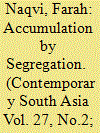

|
|
|
|
|
| Summary/Abstract |
This article is part of a Book Forum review of Ghazala Jamil’s book Accumulation by Segregation (2017). The Book Forum consists of individual commentaries on this text by four interested scholars, followed by a response by the author. The article may be read individually or alongside the other contributions to the Forum, which together constitute a comprehensive discussion of the themes and arguments in the book.
|
|
|
|
|
|
|
|
|
|
|
|
|
|
|
|
| 2 |
ID:
167254
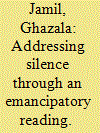

|
|
|
|
|
| Summary/Abstract |
This article is part of a Book Forum review of Ghazala Jamil’s book Accumulation by Segregation (2017). The Book Forum consists of individual commentaries on this text by four interested scholars, followed by a response by the author. The article may be read individually or alongside the other contributions to the Forum, which together constitute a comprehensive discussion of the themes and arguments in the book.
|
|
|
|
|
|
|
|
|
|
|
|
|
|
|
|
| 3 |
ID:
048456
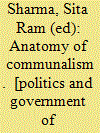

|
|
|
|
|
| Publication |
New Delhi, APH Publishing Corporation, 1998.
|
| Description |
300p.
|
| Contents |
Vol. II
|
| Standard Number |
8170249333
|
|
|
|
|
|
|
|
|
|
|
|
Copies: C:1/I:0,R:0,Q:0
Circulation
| Accession# | Call# | Current Location | Status | Policy | Location |
| 041819 | 302.14/SHA 041819 | Main | On Shelf | General | |
|
|
|
|
| 4 |
ID:
064203
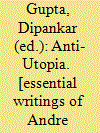

|
|
|
|
|
| Publication |
New Delhi, Oxford University Press, 2005.
|
| Description |
viii, 494p
|
| Standard Number |
0195672291
|
|
|
|
|
|
|
|
|
|
|
|
Copies: C:1/I:0,R:0,Q:0
Circulation
| Accession# | Call# | Current Location | Status | Policy | Location |
| 049799 | 330.15/GUP 049799 | Main | On Shelf | General | |
|
|
|
|
| 5 |
ID:
075566
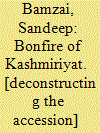

|
|
|
|
|
| Publication |
New Delhi, Rupa and Co, 2006.
|
| Description |
xviii, 290p.hbk
|
| Standard Number |
8129110601
|
|
|
|
|
|
|
|
|
|
|
|
Copies: C:1/I:0,R:0,Q:0
Circulation
| Accession# | Call# | Current Location | Status | Policy | Location |
| 052090 | 954.604/BAM 052090 | Main | On Shelf | General | |
|
|
|
|
| 6 |
ID:
117119
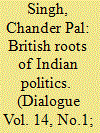

|
|
|
| 7 |
ID:
122655
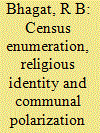

|
|
|
|
|
| Publication |
2013.
|
| Summary/Abstract |
Census is considered to be a scientific exercise. However, it leaves a deep impact on religious and ethnic identities. This is because through census enumeration not only are boundaries of communities fixed, but also actual size and growth are known. This adds a new sense to the identities of the religious communities in the sphere of democratic politics. In India, the census was started around 1872 during the British rule, seven decades after the first census was held in Great Britain in 1801. The question on religion was included right from the first Indian census, unlike the British census which only included it in 2001. This paper shows that the inclusion of the question on religion, and the consequent publication of data on size and growth of population by religion during British rule, invoked sharp communal reactions. The demographic issues found a core place in the communal discourse that continued in independent India. The paper argues that the demographic data on religion was one of the important factors that raised Hindu-Muslim consciousness and shaped the Hindu and Muslim relationship in both colonial and postcolonial India. As a result, several demographic myths have found a place in the communal discourse shaping the political imagination of India.
|
|
|
|
|
|
|
|
|
|
|
|
|
|
|
|
| 8 |
ID:
079532
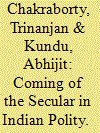

|
|
|
|
|
| Publication |
2007.
|
| Summary/Abstract |
Instead of searching for a definitive connotation of what is 'secular', the present essay explores how secular concepts gradually arrived on the scene of the Indian polity from a variety of areas and re-examines possibilities of probing the place of the secular in Indian polity by problematising its practice over time. Our methodology involves a shift of focus in searching for the roots of this concept in local and peripheral arenas rather than central texts and events. The dynamics of Indian centre-periphery relations have been dominantly historicised by the struggle for independence. This essay highlights the relevance of peripheral texts in defining secular aspects of polity, examining the dominant texts of the centre from the vantage point of the margin. While documenting an alternative discursive construction of secular politics in India, a sociologically informed reading on the question of 'the secular' argues that it will never dominate Indian politics without multiple challenges
|
|
|
|
|
|
|
|
|
|
|
|
|
|
|
|
| 9 |
ID:
117506
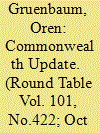

|
|
|
| 10 |
ID:
173328
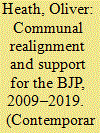

|
|
|
|
|
| Summary/Abstract |
To what extent has the BJP managed to capture the rural vote? And how does the party’s level of support relate to poverty and literacy? Is the Hindu-Muslim divide becoming more pronounced – or has it faded as the party seeks to broaden its appeal? Using constituency level data linked to census data, this article examines support for the BJP and patterns of social realignment at the constituency level from 2009 to 2019. In particular, I examine the impact of social cleavages related to the level of urbanisation, poverty, and literacy within a constituency, as well as its religious and caste profile. Using OLS regression with state-level fixed effects I present a detailed analysis of the social profile of places where the BJP has prospered over the last ten years and the major socio-geographical fault lines that run through the country. The results show that over the last three election cycles support for the BJP has become increasingly polarised along communal lines.
|
|
|
|
|
|
|
|
|
|
|
|
|
|
|
|
| 11 |
ID:
080312
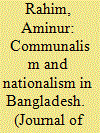

|
|
|
|
|
| Publication |
2007.
|
| Summary/Abstract |
The scholars of the South Asian politics have tended to take a one-dimensional view in national formations in Bangladesh, that is, identity formation is seen as either instrumental or primordial. Relying on the conceptual framework of social formation, this article argues that `Bengali' and `Muslim' are complementary. Group solidarity itself is seen as a social process that links to the everyday world that provides the space for the identity formation. It transcends the narrow utilitarian principle to strive for securing and organizing power itself
|
|
|
|
|
|
|
|
|
|
|
|
|
|
|
|
| 12 |
ID:
108305


|
|
|
|
|
| Publication |
2011.
|
| Summary/Abstract |
The Greek Orthodox Church in Palestine, the largest of the Christian denominations, had long been troubled by a conflict ("controversy") between its all-Greek hierarchy and its Arab laity hinging on Arab demands for a larger role in church affairs. At the beginning of the Mandate, community leaders, reacting to British official and Greek ecclesiastical cooperation with Zionism, formally established an Arab Orthodox movement based on the structures and rhetoric of the Palestinian nationalist movement, effectively fusing the two causes. The movement received widespread (though not total) community support, but by the mid-1940s was largely overtaken by events and did not survive the 1948 war. The controversy, however, continues to negatively impact the community to this day.
|
|
|
|
|
|
|
|
|
|
|
|
|
|
|
|
| 13 |
ID:
080311
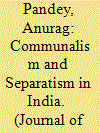

|
|
|
|
|
| Publication |
2007.
|
| Summary/Abstract |
Due to the rise and growth of the Bhartiya Janata Party (BJP) with its sister organizations in Indian politics, the existence of the Muslim political elite's communal attitude, acceptance of liberalized economic policy by India and the rise in mutual suspicion and hostile attitude among both Muslims and Hindus, India may witness a violent civil war between Hindus and Muslims in the future. The clashing political and economic interests and confronting attitude from both sides may lead them to be two different nations again. The spectre of Two Nations Theory may emerge once again.
|
|
|
|
|
|
|
|
|
|
|
|
|
|
|
|
| 14 |
ID:
143505
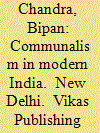

|
|
|
|
|
| Publication |
New Delhi, Vikas Publishing House Pvt Ltd, 1984.
|
| Description |
xii, 363p.hbk
|
| Standard Number |
0706925106
|
|
|
|
|
|
|
|
|
|
|
|
Copies: C:1/I:0,R:0,Q:0
Circulation
| Accession# | Call# | Current Location | Status | Policy | Location |
| 023122 | 954.052/BIP 023122 | Main | On Shelf | General | |
|
|
|
|
| 15 |
ID:
167253
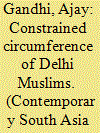

|
|
|
|
|
| Summary/Abstract |
This article is part of a Book Forum review of Ghazala Jamil’s book Accumulation by Segregation (2017). The Book Forum consists of individual commentaries on this text by four interested scholars, followed by a response by the author. The article may be read individually or alongside the other contributions to the Forum, which together constitute a comprehensive discussion of the themes and arguments in the book.
|
|
|
|
|
|
|
|
|
|
|
|
|
|
|
|
| 16 |
ID:
084242
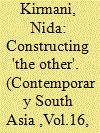

|
|
|
|
|
| Publication |
2008.
|
| Summary/Abstract |
The research for this paper is based in a majority-Muslim neighbourhood in South Delhi, Zakir Nagar. As with most urban localities, the borders around Zakir Nagar are permeable-with residents frequently moving in and out of the neighbourhood and coming into contact with members of other religious groups. Many of the residents of Zakir Nagar have also lived in religiously mixed areas previously. Furthermore, although the neighbourhood is itself identified as 'Muslim', it is by no means homogeneous, so that multiple social boundaries operate even within this locality. This paper looks more closely at the issue of religious identity as it was narrated in relation to various and shifting 'others'. These 'others'-referred to in the context of friendship, neighbours and marriage as well as in terms of discrimination, riots and 'communalism'-were often identified as 'Hindus' or as 'non-Muslims', but were also often referred to members of different class, status or regional groups. Hence, boundaries around 'us' and 'them' shifted according to context and were contingent upon various factors alongside religious identity. Through the narratives of Zakir Nagar residents, religious identity emerged as itself a problematic category whose meaning and
|
|
|
|
|
|
|
|
|
|
|
|
|
|
|
|
| 17 |
ID:
107273
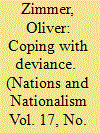

|
|
|
|
|
| Publication |
2011.
|
| Summary/Abstract |
This article highlights two processes that shaped Swiss nationhood in the long nineteenth century. The first concerns the competition between different nation-states and the nationalist visions these contests engendered. In a Europe dominated by the norm of the culturally and ethnically homogenous nation, the Swiss authorities, public intellectuals and various political representatives were desperate to display an image of national authenticity to the outside world. The result was a nationalism that combined voluntaristic and organic elements. In the second and main part of this article, the focus turns on citizenship; it is conceived not only as a social and legal institution, but also as a cognitive prism through which people defined their membership in the national community. Remarkably, the authority in granting national citizenship to foreign nationals remained firmly in the hands of the cantons and, above all, the Swiss municipalities. In practical terms, this meant that the Gemeinde provided the institutional and cognitive frame through which nationhood was primarily experienced, imagined and defined. While Switzerland represents a particularly strong case of a communalist polity, it should not be treated as unique. Instead, it should alert us to a potentially fertile yet little-explored area of research: what might be called the communal embededdness of the national(ist) imagination.
|
|
|
|
|
|
|
|
|
|
|
|
|
|
|
|
| 18 |
ID:
096600
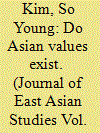

|
|
|
|
|
| Publication |
2010.
|
| Summary/Abstract |
The Asian values debate has been long on speculative advocacy but short on empirical validation, with statistical tests emerging only lately. This study explores two questions: whether Asians indeed hold distinct cultural attitudes when compared with non-Asians and whether these cultural attitudes and beliefs identified as Asian values form coherent dimensions among Asians. The study first identifies four dimensions of Asian values based on a review of various Asian values discourses: familism, communalism, authority orientations, and work ethic. The findings from the empirical analysis based on multilevel models and factor analysis return mixed support for the Asian values hypothesis. Although East Asian respondents do exhibit strong work-related values compared with those from other regions, commitment to familial values and authoritarian orientations are actually lower among East Asians. Also, while preference for strong leadership and parental duty do turn out to form distinct sets of attitudes among South and Southeast Asians, the four dimensions do not constitute a clear value complex in the minds of East Asians.
|
|
|
|
|
|
|
|
|
|
|
|
|
|
|
|
| 19 |
ID:
139616
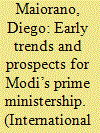

|
|
|
|
|
| Summary/Abstract |
In May 2014 Narendra Modi became India’s Prime Minister in the wake of a historic electoral victory. He has generated two kinds of expectations: on the one hand, his voters expect him to create millions of new jobs for a fast-growing working age population; on the other hand, Hindu extremists hope that he will pursue an aggressive policy aimed at ‘hinduising’ India’s society. The first months of his premiership show that Modi is acting in both spheres, while pursuing a radical centralisation of power in his hands.
|
|
|
|
|
|
|
|
|
|
|
|
|
|
|
|
| 20 |
ID:
167251
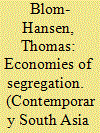

|
|
|
|
|
| Summary/Abstract |
This article is part of a Book Forum review of Ghazala Jamil's book Accumulation by Segregation (2017). The Book Forum consists of individual commentaries on this text by four interested scholars, followed by a response by the author. The article may be read individually or alongside the other contributions to the Forum, which together constitute a comprehensive discussion of the themes and arguments in the book.
|
|
|
|
|
|
|
|
|
|
|
|
|
|
|
|
|
|
|
|
|